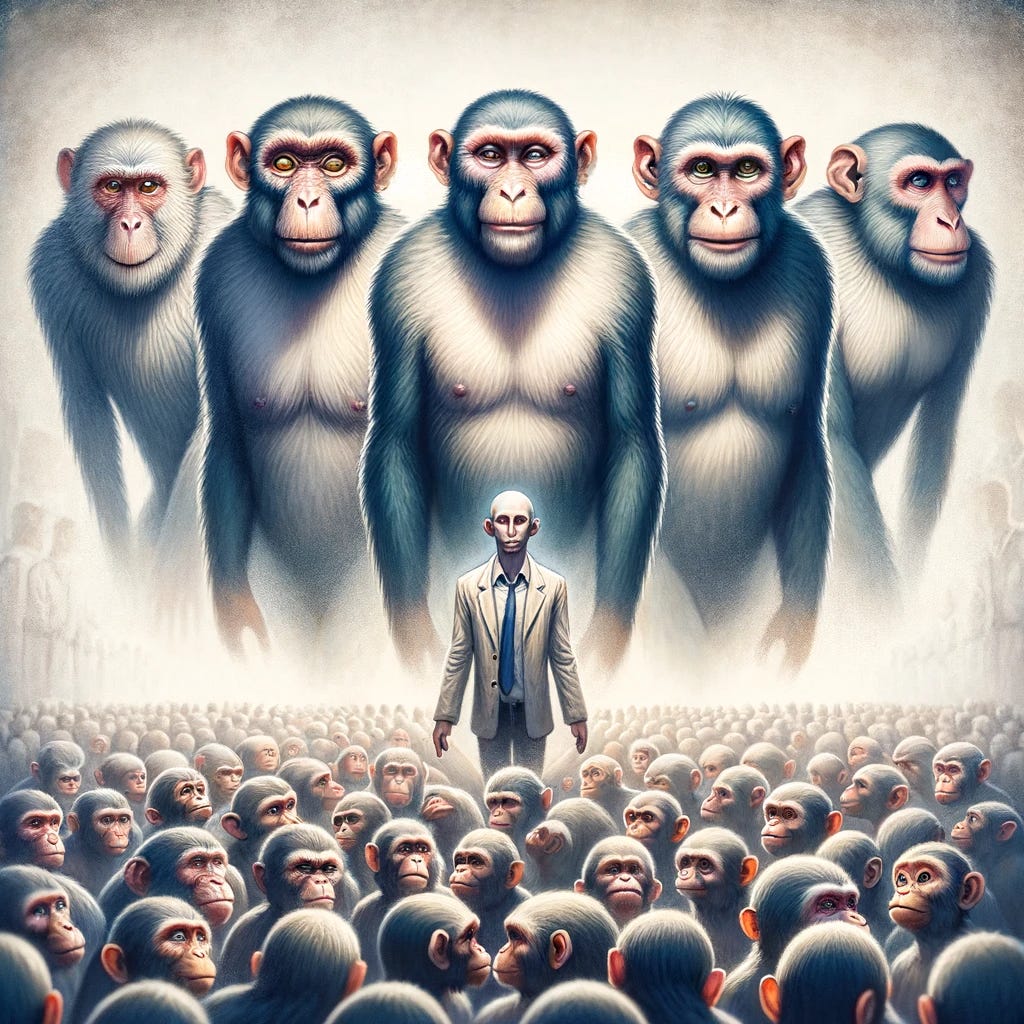Pro friendship tip: when your friend is giving a presentation, ask the people sitting around you to clap with you as soon as it ends. Next thing you know, the whole place is clapping.
Why does that work every time? (as long as your friend isn’t doing live poetry… ew)
Simple answer - because we follow the group.
Next question - why do we follow the group?
Why We “Follow The Group”
It’s the same reason for the emotion default and ego default. We still have monkey brains! We needed to fit in to survive. As small tribes who never knew what the next day could bring, having loose ends was dangerous.
Everybody had to fall in place or be left alone to die. Only the people who felt a need to fit in survived. Fast forward a few hundred thousand years to today and everybody’s brain (with exceptions, of course) is programmed to fit in with the crowd.
It’s called “the social default”. It’s all around us. It’s practically unavoidable.
“No one grows up saying I want to do the same thing everyone else is doing. And yet there is a comfort to surrounding yourself with people who agree with you, or who are doing the same thing you’re doing.” (25)
We feel good following the people around us for two reasons:
We feel less likely to make a mistake
We can’t be blamed for doing what everyone else is doing
This is part of how we end up with obvious systemic issues that never get solved. It’s the reason people always talk about startups that “disrupt the industry”. Why are small companies able to come into an established industry and solve the customer’s problems better than the huge companies with decades of experience?
Why Big Companies Get “Disrupted”
zTrip is the largest taxi-owner in the USA, with over 2,700 taxis across 26 cities. Imagine if before Uber, a senior manager at zTrip thought of the idea of a rideshare app where people drive their own cars, instead of taxis. He was convinced that would be the future of cars.
He could:
go to his boss, a very successful man, the owner of thousands of taxis, and tell him the company needs to change course or
he could keep his mouth shut.
In situation a, he’s gambling his job pretty hard. He makes an unorthodox decision, not following the pack and there’s two possible outcomes:
He’s right! His boss thanks him and gives him a modest bonus.
He’s wrong! His boss fires him and his kids get no Christmas presents.
Essentially, he gets a gold star or kicked in the nuts.
That’s why he went with option B, and kept following the course even though he was convinced by the reality around him that he was right. That’s why small companies are the ones that come and disrupt industries, and not the existing powerhouses (also because of the inertia default, but that’s for tomorrow).
The real trap of the social default is summed up well by legendary investor Warren Buffett,
“The fact that other people agree or disagree with you makes you neither right nor wrong. You will be right if your facts and reasoning are correct.”
Beware, when you want to learn about a new topic and form an opinion, search for facts, not agreements. Unless you’re happy being a lemming. That’s fine. Lemmings get a bad rap as a species, but you can’t name an individual bad lemming.
Key Takeaways:
Social default is our first tendency to follow the crowd
Agreement doesn’t determine correctness, facts and reasoning do
Change is slow because individuals get rewarded lightly if they’re right and punished harshly if they’re wrong
Brains Gains (from Morgan Housel)
What do I believe is true only because believing it puts me in good standing with my tribe?
Have an amazing day. Be as nice as you can be, not just as nice as you need to be.
Your Friend,
Noah “BigNerd” Sochaczevski
*PS. This article was hard to write. Very hard. Shane Parrish packed so much knowledge into the 6 pages on Social Default, I had to stop myself from underlining it all. I couldn’t do it justice and touch on everything, so I HIGHLY recommend that you read this chapter uninterrupted. With time to think.


